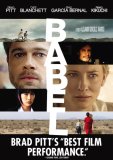| Reviews & Columns |
|
Reviews DVD TV on DVD Blu-ray 4K UHD International DVDs In Theaters Reviews by Studio Video Games Features Collector Series DVDs Easter Egg Database Interviews DVD Talk Radio Feature Articles Columns Anime Talk DVD Savant Horror DVDs The M.O.D. Squad Art House HD Talk Silent DVD
|
DVD Talk Forum |
|
|
| Resources |
|
DVD Price Search Customer Service #'s RCE Info Links |
|
Columns
|
|
|
Babel
THE MOVIE:
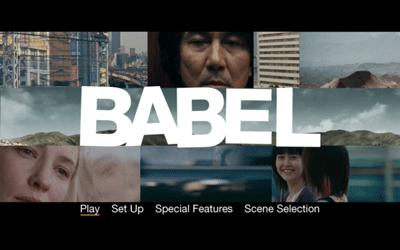
A man gives another man a gun as a gift. The second man then sells the gun to a family of Moroccan goat herders, creating a chain reaction of events that touches all of the people who have their tangential fingerprints on the rifle in question. It's the butterfly effect, but without Ashton Kutcher or time travel.
Babel, director Alejandro González Iñárritu's first film since the emotionally devastating 21 Grams, is the latest in the genre of we-are-all-connected films that regularly cleans up at awards season and serves to make us all feel good about our place in the global village. Neither as pompous and self-righteous as the execrable Crash or as silly and ill-planned as TV's "Heroes," Babel walks somewhere in the middle. Iñárritu is trying to make something a little darker, a little less tidy, to say that the things that connect us can also create rifts. Most importantly, though we all communicate with language, we don't speak the same one, and try as we might to break through, this obstacle hold us back.
The title Babel is actually from the Bible, and if I remember my Sunday school lessons correctly, it's pronounced like "babble" (which kind of a neat piece of etymology, when you think about it). The story of the Tower of Babel is that early on in mankind's existence, we all spoke the same language. That allowed us to get together and make plans using our collective hubris, and humans tried to build a structure that would reach God up in the Heavens. Angry that his subjects would think they could touch His heights, the wrathful Old Testament deity smote them. As punishment, he split up the human tribe and created different languages. What was once united was now divided.
Isn't there some rule about giving your movie a title that could amount to self-prophecy? (Think Failure to Launch.) Babel seems to be Iñárritu's own act of hubris, a towering effort that falls under its own weight before it reaches its big finish, unable to tell audiences what it's really trying to say. The structure is solid, and the whole thing looks impressive when you stay far enough back. Once you look inside, however, you'll find the place is hollow. There's nothing but exterior.
The central event of Babel is that the two Moroccan brothers in charge of their family's herd (Boubker Ait El Caid and Said Tarchani) start fooling around with the gun and shoot at a bus on the road down from their mountain perch. The bullet strikes an American tourist who is on vacation with her husband, creating a literal life-and-death situation for this couple seemingly out of nowhere. Played by Brad Pitt and Cate Blanchett, this is supposed to be the hub of the story, but it's actually the least interesting aspect of the picture. Iñárritu pulled some impressive stunt casting, getting two well-respected actors who are also very popular. So, why does he give them nothing to do? Pitt spends the movie being angry, forceful, and American, while Blanchett basically lies around and bleeds.
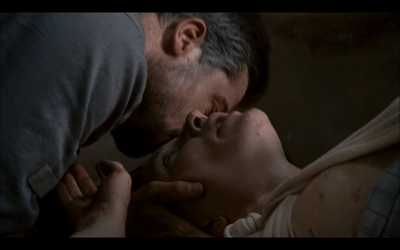
Back home in California, the tragedy creates all sorts of complications for the couple's illegal immigrant nanny, Amelia (Adriana Barraza). She is the sole caregiver for their two children until Pitt and Blanchett can return, but her son is getting married down in Mexico. This leaves her no choice but to take the kids with her. They load into a car with her nephew Santiago (Gael García Bernal, Science of Sleep), but before the day is through, all four of them are going to get a lesson in the difficulties in border crossing. It might be easy to get into Mexico, but they should have planned better for how they were going to get back. Bernal is the one to watch in this sequence. He's always great, but Iñárritu really lets him cut loose as the chicken-killing partier Santiago. He's the guy you want to call if you go shopping for loud shirts, but he's not going to be the best accessory to carry with you through customs.
The third and final storyline unfolds in Tokyo, and it's by far the best--which is ironic, since it's also the one farthest removed from the gun drama. The main character in this segment is Chieko, a deaf-mute teenage girl played with awesome conviction by Rinko Kikuchi (Survive Style 5+). Chieko is struggling with adolescence, a difficult time only made more difficult by the fact that her mother recently died. Her father (Kôji Yakusho, Memoirs of a Geisha) tries to be understanding and concerned, but he maintains a distance--exactly what the girl doesn't need. She's desperate for some kind of contact, leading her to shameless flirting. Of all the characters in Babel, though, she's the one with the biggest obstacle to understanding. She's in a country where she understands the language, but her physical impairments still block her from meaningful communication with most people. She's frustrated, angry, and sad.
Chieko on her own would have been a fantastic subject for a movie. Iñárritu portrays her world with a deft hand, manipulating sound to move us in and out of the girl's perspective. Whenever Babel moved over to the other plot threads, I always wanted the film to go back to Japan. The thing is, it's also the story that is the least affected by the shooting in Morocco. It was Chieko's father who gave his guide the rifle years before on a hunting trip, and the only way the shooting really touches them is that the police officer sent to investigate the ownership of the gun provides Chieko with her last desperate outreach. Sure, it fits the idea that everyone is connected somehow, but as the camera pulls back on the final shot of father and daughter in Tokyo, I was left asking, "Why?"
Because really, Babel says a lot, but ultimately, it conveys very little. For all the zigzagging around the world, I'm at a loss for what Iñárritu wanted us to walk away from this movie with. I don't think it's a problem with the storytelling, as he has a clear grasp of all of the elements that compose the movie and where the pieces fit. As usual, I am stunned by his ability to manipulate time within his narrative, playing interesting tricks with our perceptions by having all of his stories run at different paces while seeming parallel (Amelia's journey doesn't even start until after Brad Pitt's final scene in the movie, for instance). So, it must be a fundamental flaw in the writing that Babel actually has no point. Sure, everyone's lives have changed, all the stories have a resolution, but the characters are now only farther apart and for no real reason. To borrow from another famous piece of writing about stories and language, Babel is a film full of sound and fury, but signifying nothing. It might not bore you while you're watching it, but it will likely leave you wondering what you invested two hours and forty minutes of your life for.
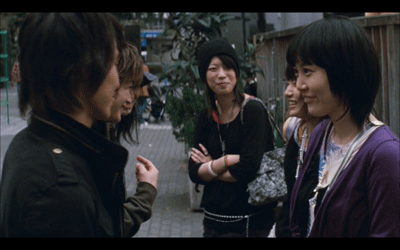
THE DVD
Video/Sound:
Babel is presented in anamorphic widescreen. The transfer is immaculate. For a DVD that was seemingly rushed out to capitalize on awards buzz, Paramount didn't skimp on the technical specs.
In addition to the fine picture quality, home viewers are also given their choice of several excellent sound options: English 5.1, English 2.0, French 5.1, and English and Spanish subtitles.
Extras:
Unless you count the film's theatrical trailer (I don't), there are none. Prepare to be double-dipped, especially if Babel wins the Oscar.
FINAL THOUGHTS:
Though Babel is an excellent technical achievement that impresses viewers with its complexity, when you break it all down and examine the pieces, it appears that the film doesn't really have the connections between its characters that the makers would like us to think it has. It's all surface, no meaning. Still, Rent It to see Rinko Kikuchi's fantastic performance in a unique coming-of-age tale that would have made a better movie on its own, free of all the palaver that surrounds it.
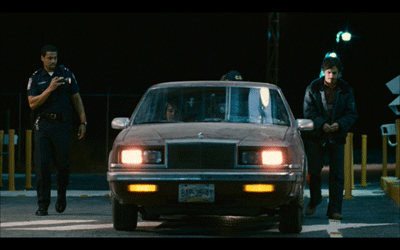
Jamie S. Rich is a novelist and comic book writer. He is best known for his collaborations with Joelle Jones, including the hardboiled crime comic book You Have Killed Me, the challenging romance 12 Reasons Why I Love Her, and the 2007 prose novel Have You Seen the Horizon Lately?, for which Jones did the cover. All three were published by Oni Press. His most recent projects include the futuristic romance A Boy and a Girl with Natalie Nourigat; Archer Coe and the Thousand Natural Shocks, a loopy crime tale drawn by Dan Christensen; and the horror miniseries Madame Frankenstein, a collaboration with Megan Levens. Follow Rich's blog at Confessions123.com.
|
| Popular Reviews |
| Sponsored Links |
|
|
| Sponsored Links |
|
|
| Release List | Reviews | Shop | Newsletter | Forum | DVD Giveaways | Blu-Ray | Advertise |
|
Copyright 2024 DVDTalk.com All Rights Reserved. Legal Info, Privacy Policy, Terms of Use,
Manage Preferences,
Your Privacy Choices | |||||||









